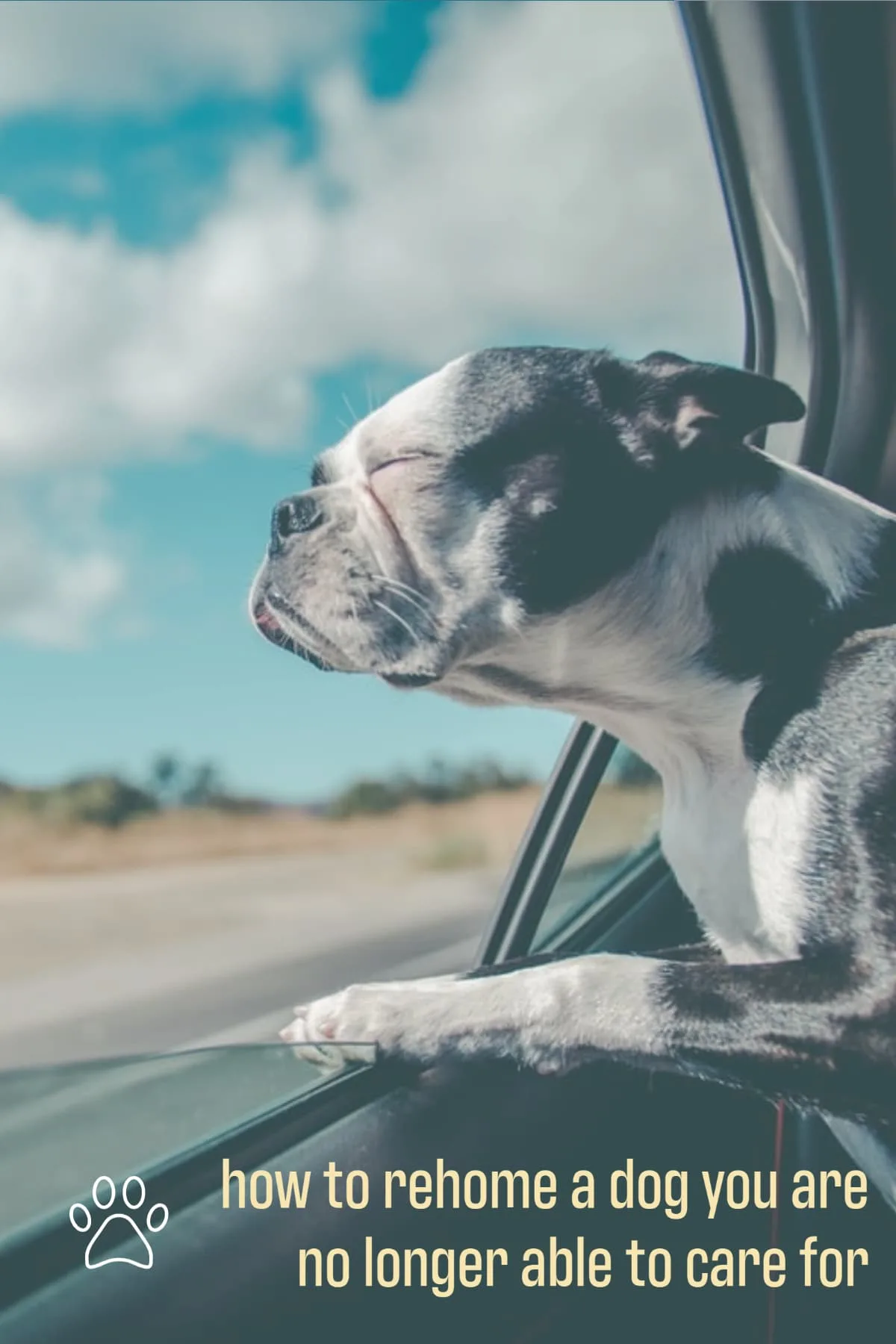Let’s talk about a not-fun topic: rehoming a pet. Although rehoming a dog is increasingly a taboo topic, sometimes rehoming is a necessary step in order for both the pet and owners to thrive.
I’ve been on both sides. I spent years volunteering for a breed rescue and, later, chose to send my beloved standard poodle to live with another family instead of moving with him to an urban high-rise. Here are my best tips for ethically rehoming a dog.

So, You’ve decided you Need to Rehome your Dog
Rehoming your dog is a difficult decision, but in many cases it is better for a dog to move to a better-suited home than to stay in a home where their behavior causes conflict, their fur causes allergies, or where they won’t be allowed by the provisions of a new lease.
You don’t have to feel guilty about realizing “I need to rehome my dog,” as long as you do it responsibly. It is important to act in the best interest of your pet. The fact that you have probably found this article by searching terms like “rehoming” or “rehome” instead of “giving it up” or “getting rid of your dog” already means you’re choosing language that shows you care about your dog and will keep their best interests in mind through the process.
5 Responsible Ways to Rehome a Dog:
Even though more and more animal shelters are no-kill shelters, it’s best to avoid using a shelter, “pound,” or humane society to rehome your dog. These shelters are already overwhelmed. They often aren’t set up to use the info you provide to help find your dog a home where it won’t end up causing conflict again. For example, a dog surrendered to a shelter due to showing aggression to smaller dogs in a home might be adopted to a family that already has a small dog. The adopted dog might cycle back through a shelter within months.
The best and kindest ways to rehome your dog, in order:
1. An “open adoption” to friends or family
When I announced my move to downtown Seattle, I knew my giant black poodle, accustomed to roaming a fenced 2.5 acre property, couldn’t come with me. I knew my dog well enough to know that he would not cope well with long hours left alone in a 280 square foot studio apartment. I put the word out on Facebook and a family with a house full of kids and a massive backyard instantly snapped him up. He lived the last four years of his life constantly entertained (and often doing the entertaining) in his new family, with another dog for company, and occasional visits from me when I returned to the area.
Given the circumstances, it could not have been a more ideal situation….given the circumstances.
Although heartbreaking to give him up, I knew it was the right decision. Being able to do an “open adoption” to people I knew gave me so much peace of mind. Seeing the dog in his new home confirmed my decision was the best for both of us.
2. A breed rescue.
If your dog is a purebred dog (or even “mostly-purebred”) the breed rescue organization for that breed may already have the perfect home screened and pre-approved. Even if your dog has issues (and you should disclose them) there could be an accommodating new owner waiting to adopt a dog that fits your dog’s description. Use a search engine to locate your breed’s rescue for your state, reach out, and explain your situation plainly.
The more popular the dog breed is, the easier it should be to find a rescue nearby. For example, there are almost a dozen french bulldog rescues in the USA.
To be entirely honest, depending on the rescue, you can expect some judgment for surrendering your dog- but you can reassure yourself that you are making the best decision for your pet and yourself, and that’s why breed rescues exist. From my years of experience working in a breed rescue I know that it was helpful for folks to remind themselves that no one knows their situation like they do and they need to move forward with what is best for them and their pet.
Most breed rescues will accept surrenders without question, but it’s helpful if you can provide a lot of information about your pet. Ideally, it’s helpful if you can make a small donation to the rescue group to offset the costs of rehoming your dog.
💡 Although this type of rescue is often organized by breed, you may find similar groups organized by breed type (i.e. all “hound” or “toy” breeds) or by age (like senior dog rescues)
3. A local foster-based all-breed private rescue.
Small and local volunteer-run rescue dog organizations partner with local foster homes. Through these organizations, your dog never has to see the inside of a shelter. Via foster homes and connections with professional dog training, the dog you need to rehome can be retrained before being rehomed through their private rescue.
With foster-home-based private rescues (which often include breed rescues) dogs never end up in a kennel, and instead get to live in a home from day one of their journey to being rehomed. To rehome your dog through one of these rescues you should check petfinder.com to locate local rescues that are not humane societies.
4. Craigslist or local classifieds.
Rehoming your dog through craigslist may be very simple or very difficult depending on your dog. It’s also fairly risky.
People acquire dogs from Craigslist for all sorts of reasons- usually as pets, but occasionally for dog-fighting or even laboratory product testing. Interview any potential adopters as best you can and never lie or sugar coat about why you need to rehome your dog – placement in the wrong home could result in the next owner not caring to rehome the dog so compassionately.
5. A No-Kill shelter
A no kill shelter should be your last resort but it is an option to rehome your dog if for some reason all other options fail. Many shelters offer surrendered dogs compassionate care, and dogs that are young, purebred, or well behaved may only spend a few days in this type of facility before being adopted.
Final Thoughts on Rehoming a Dog
What it Means to Rehome a Dog
Rehoming a dog is a fairly new term- but what does it mean? Rehoming a dog means to surrender it to an adoption organization or to find a new home for the dog yourself.
People Rehome Dogs for Many Valid Reasons
Maybe you are moving out of the country, moving in with a dog-allergic partner, have a suddenly aggressive dog towards a newborn, or find yourself unprepared to be able to meet the needs of your pup (health or otherwise). There’s no shame in seeking out a home where your pet can get the care they need while you move forward. Cultural shame around this topic can make some resources hard to find, This is unfortunate, since shaming individuals about their choice does nothing to improve their dog’s life or an owner’s ability to care for their pet.
Regardless of the method you choose to follow through with the decision to rehome your dog, be sure to be thorough and honest with the people who you surrender your dog to. Complete honesty can help provide the best possible outcome for your dog and help you feel better by knowing that you did the right thing to help your dog find its true forever home.
Successful Rehoming from a Scientific Perspective
After conducting extensive research on dog rehoming, I have studied the work of several experts in this field. While I won’t simply repeat their insights here, I want to emphasize that the five rehoming methods I present in this article align with the advice provided by highly qualified professionals.
In my exploration of this subject, I came across a valuable quote from a Science Direct publication that succinctly captures a key takeaway. It highlights that “there are many factors involved in a successful adoption and it is important that the new owners are informed of what to expect are encouraged to attend training classes and are prepared to work at any behavioral problems that their dog may have.” As someone with decades of experience in pet ownership, this point deeply resonated with me, and I have endeavored to reflect this ethos throughout the article.
It’s important to recognize that rehoming a dog is a significant decision that requires careful consideration and planning. As such, I hope that the tips I’ve presented in this article can serve as a useful resource for those who are seeking to rehome their furry friend. My aim is to provide practical guidance that can help facilitate a smooth and successful transition for both the dog and their new family.

What does it mean to “rehome a pet”?
The phrase “rehome a dog/rehome a pet” means giving away a dog to a new home. In recent years, this phrase has gained popularity and replaced phrases like “giving up a pet,” “surrendering a dog to a shelter,” or “getting rid of” a dog. “Rehoming” communicates a more compassionate transfer of pet ownership. To rehome a dog specifically implies that the person is looking for a new home for their pet, rather than abandoning it or carelessly giving it away.
I wrote this article a few years ago when I owned a pet supply store and recently found it in my unpublished drafts. Not much has changed in the decade since I wrote it –except that I’ve had to give away a pet of my own and now have personal experience to add– so I thought I’d update it and share it below.
Thanks for Reading!!!
I hope you can tell that I love DIY, researching the best affordable solutions for every-day problems opportunities and documenting / sharing solutions!🙌 Hawk-Hill.com is reader-supported.
☕ Hawk-Hill.com is reader-supported. If this article saved you time or money, please consider donating $1 to help me cover the cost of hosting this website OR If you appreciate this information and want to throw a “Thanks!” my way by buying me a coffee – I would Of Course appreciate it! :]
Reader Questions and Recommendations
Readers, do you have any favorite topics / posts? What would you like to read more about in the future? As I hope you can tell from this and other articles on my site, I really enjoy DIY / a good challenge, and I’m not afraid to roll up my sleeves to figure out a great, and hopefully simple 😁 solution. So please feel free to let me know in the comments below (or reach out via social media)!
Ok Really – I’ll try to wrap this up now😂
Finally, if you’d like to continue to learn about interesting DIY options as well as how YOU can tackle creative new projects consider checking out the latest and most popular articles listed on the Hawk-Hill Home Page. I’m always trying to enjoy and write about the creative side of life so please don’t be a stranger – check back often!😍
If you enjoyed this post you may also enjoy reading / perusing / devouring😊 one or all of these articles as well!



KMO
Saturday 6th of November 2021
I really appreciate your post. My husband and I have been struggling with the decision to rehome our dog that we rescued from a local shelter 2 years ago. We don’t feel like we are giving him the best life. We strongly believe he needs an owner(s) who can keep up with his high energy, doesn’t have kids, and can work on correcting his behavioral challenges. We are two working parents with a small child and we just can’t give him the attention that he needs. We love him enough to admit we might not be the best fit for him and he deserves more out of life. We haven’t really begun the process yet but you’ve given very helpful guidelines to know where to start. Thank you for offering a non judgmental space. This is a hard enough decision emotionally as is to also have to deal with judgment.
Jean
Monday 6th of September 2021
Hi! This is a very helpful post! Thank you so much for posting it. My current situation is that I will no longer be able to care for our 5 month old mini golden doodle puppy. My husband and I seriously took into consideration the work it would take, but life has happened and medical things have come up as well (thank you in advance for not judging). We love her and still want her in the family. My parents are moving to my area in the next month and want her more than anything. I’m wondering if this makes things any different. The puppy will be living with them, but my husband and I would be visiting often. Will this make the transition harder and confusing if she lives with them but still sees us on a regular basis? I’d really appreciate any feedback! We are grateful she will still be in the family but want to make the transition as smooth as possible.
Lindsayanne Brenner
Monday 6th of September 2021
I'm glad you are making the right decision for you and your dog I wouldn't worry about the attachment piece too much. It might be stressful, but the dog won't suffer as long as it feels safe and loved. Service dogs, which must be closely bonded with their handlers, change hands several times (puppy raisers to trainers, trainers to handlers) without ill effect. One method service dog programs use, which you may want to include in your pups transitions, is a period of uninterrupted bonding: drop the dog off with your parents at the start of a long weekend where they will be home all weekend and able to actively spend time with the dog, and don't visit during that period (maybe up to a week or two). This may help your dog attach with less confusion.
Tamir
Saturday 24th of July 2021
Thank you so much.